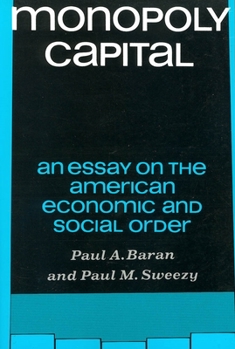Monopoly Capital
Select Format
Select Condition 
Book Overview
This landmark text by Paul Baran and Paul Sweezy is a classic of
twentieth-century radical thought, a hugely influential book that
continues to shape our understanding of modern capitalism. "This book...
deals with a vital area of economics, has a unique approach, is
stimulating and well written. It represents the first serious attempt to
extend Marx's model of competitive capitalism to the new conditions of
monopoly capitalism."...
Format:Paperback
Language:English
ISBN:0853450730
ISBN13:9780853450733
Release Date:January 1966
Publisher:Monthly Review Press
Length:416 Pages
Weight:1.10 lbs.
Dimensions:1.1" x 5.5" x 8.4"
Customer Reviews
2 ratings
Brilliant Period Piece
Published by Thriftbooks.com User , 17 years ago
"Monopoly Capital" is a classic of radical literature. Written in the 1960s, it argued that oligopolies had taken over the U.S. economy and that oligopolistic industries inevitably generated more "surplus" than the economy could absorb under peacetime conditions. As a result, although huge military spending during World War II and the Cold War had staved off depression, the U.S. economy would tend toward stagnation and idle capacity in the long run. Meanwhile, capitalism would divide the races and ruin the quality of sex and leisure activities. It's hard to know how to review an old masterpiece like "Monopoly Capital." A few parts were plainly goofy, such as the pop-Freudian analysis of the American family. Other parts were only marginally relevant to the central argument, such as the diatribe against the American school system. The book was shockingly blind about the defects of the Soviet Union. Most damaging of all, central parts of the analysis were overtaken by later developments, such as the rise of corporate takeovers (which empowered financial markets) and globalization (which subjected oligopolies to gales of foreign competition). I suspect the book would be quite different if Baran and Sweezy were writing today. But none of these criticisms can detract from the brio and sheer brilliance of "Monopoly Capital." After all, Marx and Veblen are dated in many ways, too. By combining analytical rigor, clear prose, and moral indignation, "Monopoly Capital" is still a great read in 2007. In fact, it's so good that it almost restores one's faith in the power of social science to rise above convention and triviality, and to probe deeply into the economic basis of society. Bravo to Monthly Review Press for keeping it in print all these decades!
Brilliant Period Piece
Published by Thriftbooks.com User , 17 years ago
"Monopoly Capital" is a classic of radical literature. Written in the 1960s, it argued that oligopolies had taken over the U.S. economy and that oligopolistic industries inevitably generated more "surplus" than the economy could absorb under peacetime conditions. As a result, although huge military spending during World War II and the Cold War had staved off depression, the U.S. economy would tend toward stagnation and idle capacity in the long run. Meanwhile, capitalism would divide the races and ruin the quality of sex and leisure activities. It's hard to know how to review an old masterpiece like "Monopoly Capital." A few parts were plainly goofy, such as the pop-Freudian analysis of the American family. Other parts were only marginally relevant to the central argument, such as the diatribe against the American school system. The book was shockingly blind about the defects of the Soviet Union. Most damaging of all, central parts of the analysis were overtaken by later developments, such as the rise of corporate takeovers (which empowered financial markets) and globalization (which subjected oligopolies to gales of foreign competition). I suspect the book would be quite different if Baran and Sweezy were writing today. But none of these criticisms can detract from the brio and sheer brilliance of "Monopoly Capital." After all, Marx and Veblen are dated in many ways, too. By combining analytical rigor, clear prose, and moral indignation, "Monopoly Capital" is still a great read in 2007. In fact, it's so good that it almost restores one's faith in the power of social science to rise above convention and triviality, and to probe deeply into the economic basis of society. Bravo to Monthly Review Press for keeping it in print all these decades!






